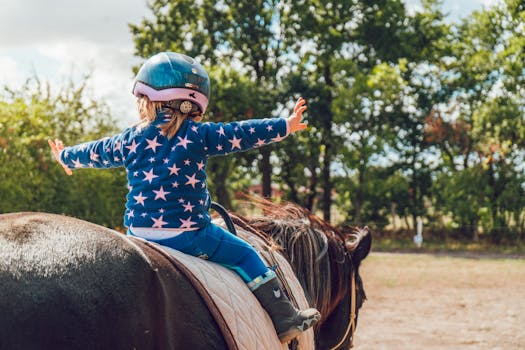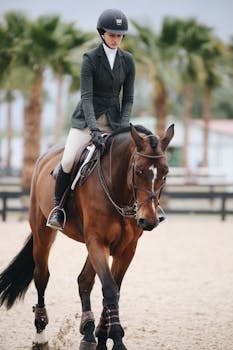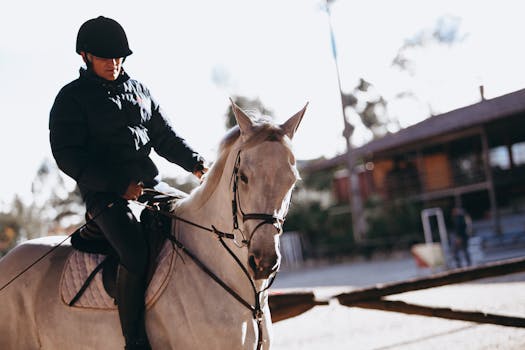 Riding can be a lifelong pursuit for many, so one should have lifelong foundation riding skills. These are key factors every rider should be taught and carry with them through each riding experience and horse. It is good to revisit these horseback riding elements, as they will make a you a better, more knowledgeable rider.
Riding can be a lifelong pursuit for many, so one should have lifelong foundation riding skills. These are key factors every rider should be taught and carry with them through each riding experience and horse. It is good to revisit these horseback riding elements, as they will make a you a better, more knowledgeable rider.
Eyes
Becoming self-aware of where you are looking during your rides is crucial. Do you stare at the ground? Are you distracted and looking all over? Picking an object in the distance or around the bend of the arena helps you maintain a more upright position and brings your focus back where it should be- looking ahead, not staring at the ground.
Continually staring at the ground or at your horse brings your focus to some negative aspects. Focusing on your horse can actually hurt your riding – instead of looking up and feeling your riding with your seat and legs, you become immersed in your horse’s headset and face. Constantly looking down at your horse will lead to frequent jerking of their mouth, or fussing with their face.
Bring your attention upwards. You can glance at your horse or use your peripheral vision. Stretch your leg down and use your seat to move forwards or gain more collection and the proper headset will follow.
Have you ever heard the horseback riding saying, “If you stare at the ground you will end up there?” Lift your eyesight and look at where you are heading – whether it be on the trail, around the arena, over to the next barrel, or to the next jump on your course.
Hands
 Do you ride with “puppy dog” hands? Are your wrists turned in or held at a “broken” angle? Do you clench the reins, or instead barely have a grip on them? The reins are a direct form of contact with your horse and a power that is not to be abused. Harsh hands or soft, weak hands can confuse the horse, even if your other riding aids are solid.
Do you ride with “puppy dog” hands? Are your wrists turned in or held at a “broken” angle? Do you clench the reins, or instead barely have a grip on them? The reins are a direct form of contact with your horse and a power that is not to be abused. Harsh hands or soft, weak hands can confuse the horse, even if your other riding aids are solid.
You want your horse smooth, calm, and responsive, and your hands are the driving factor. Are you riding using only your reins? Do you use a rein to turn or do you use your leg and the weight of your seat?
Becoming too “handsy” will make your horse have a hard mouth and brace against anything you ask of it, and for a good reason. It hurts. Be flexible but firm with your reins and hands. In the book Centered Riding, Sally mentions holding your reins like they are two little birds- soft enough to not hurt them, but firm enough to not let them get away.
Ride with forgiving hands, and your horse will respond accordingly. Click To Tweet
Seat
Riding with your seat is a key fundamental element in horseback riding. Riding with your seat drives the horse up into the bridle. Not enough leg and hands that are too hard will leave a horse unwilling or afraid to go forward. Too much leg and no hands at all will encourage the horse to run through the bridle or rush around through all of its gaits.
Riding with your seat and legs can allow a rider to stop their horse, start forward motion, back up, adjust the speed of each gait, and move laterally.
Related Content:
Should Riders Earn Their Stirrups?
The Ultimate Guide to Horse Show Etiquette
Time in the saddle is the best way to learn to ride with your seat. Follow the horse’s motion at the walk and allow your legs to become long – stretching down with your weight in your heels. This may take some time to accomplish, but once the balance between riding with your seat and using your hands has coordinated, your riding experience will only get better.
Patience
Patience is a fundamental element all riders need to have. At some point frustration between horse and rider happens. Frustration can stem from unclear or mixed signals coming from the rider, asking the horse to do something it is not familiar with or has not yet been trained on, outside influences such as bad weather or scary surroundings, and many other factors that can affect your ride time.
Remember that a horse can only respond to what it has been taught- or with the information you have provided it. The problem may be the rider. The problem can also be the horse. Is it scared? Confused? Patience with horses establishes trust. Take a deep breath and calm and center yourself. Ask again slowly and clearly.
Have patience when training something new. Does your horse understand? Are they physically and mentally capable of what we are asking them to do? Your horse may not be ready physically for the task you are commanding.
We as humans are generally NOT expected to get something right on the first try. Horses too need time to comprehend and understand.
Consistency
Consistently working with your horse will yield results faster. It is similar to going to the gym. Consistently hitting the gym will help you drop weight and build muscle (depending on the type of exercises you are doing.) You will see results quicker. Stopping your gym sessions can cause relapses in your progress. If you wait long enough, you may have to start all over because your muscles will have shrunk, or you might have gained the weight back that you had lost.
 Horses need consistent work. Teaching them something and then not following up is confusing. They may need to start all over and relearn. Consistency also helps develop a rapport between you and your horse – establishing trust and familiarity which helps with immensely with training.
Horses need consistent work. Teaching them something and then not following up is confusing. They may need to start all over and relearn. Consistency also helps develop a rapport between you and your horse – establishing trust and familiarity which helps with immensely with training.
The best teacher is time spent in the saddle. Taking a few lessons can also help further your understanding and equestrian knowledge as well. Remain patient and consistent, and the progress will come.
Don’t break the trust by losing your temper. Take a step back and take a deep breath. Understanding and training can take time, and as you and your horse reach milestones with each fundamental element, you will begin to see how horse and rider work in harmony. Have a great ride!